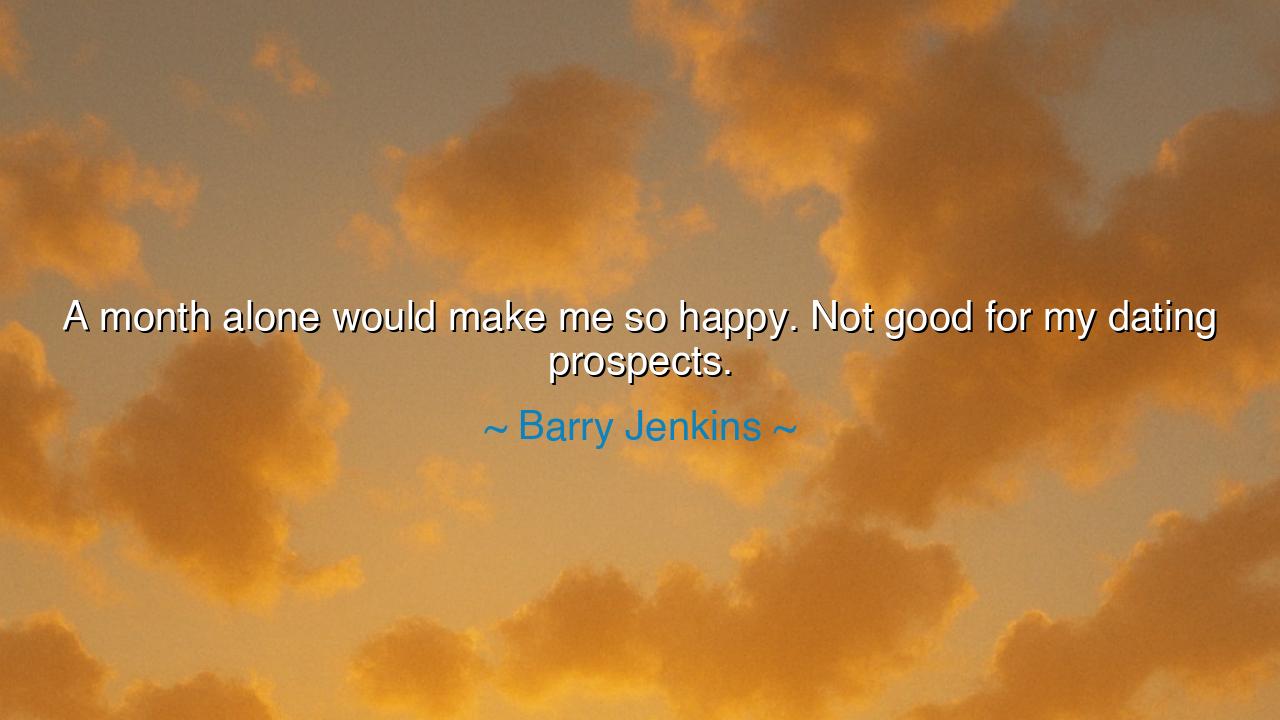
A month alone would make me so happy. Not good for my dating






In the quiet ledger of the heart, a filmmaker speaks a paradox that feels like a blessing and a warning: “A month alone would make me so happy. Not good for my dating prospects.” So says Barry Jenkins, and the words land like rain on warm stone—soft, cleansing, unmistakable. They teach that solitude can be a banquet, even while the world takes attendance at the feast and frowns if you dine without a partner. In this single line, two truths meet: the soul’s craving for a chamber of its own, and society’s habit of judging worth by the noise of our calendars.
Hear the wisdom nested within. To desire a month alone is not misanthropy; it is stewardship. It is the art of letting the mind uncoil, of letting the pulse slow until ideas come home like birds at dusk. For some, this is the wellspring of craft; for others, the medicine that keeps kindness from thinning. But because the market prizes the visible exchange—names, dinners, posts—the lover of solitude jokes about those dating prospects, as if the price of inner peace were outer suspicion. Thus the line smiles, but the smile has edges: it names a culture that confuses availability with value.
Consider the origin of such a confession in a life spent building images that glow from the inside out. Creation demands hours when the door is barred and the lamp is low; a film, a book, a score—each asks its maker to step out of the river so they can learn again how to hear. In that stepping out, many discover that happiness is not a crowd but a clarity—the kind that returns when obligations cease their tapping and the room remembers your true name. And still, when they re-enter the square, questions crowd them: “Why alone? What about love? What of your prospects?” The pressure is old; the practice of guarding the inner room must be older.
Let a story walk beside this teaching. A young painter once vowed to keep a Sabbath of solitude—thirty days to wake with light, work without witness, walk until the city’s buzz became the river’s hush. Friends teased her about her dating prospects, promising to rescue her from her vows with tickets and introductions. She kept the month anyway. Her canvases deepened; a tenderness returned to her speech. When the thirty days ended, she did not hate the bustle; she simply chose it with a cleaner hand. Later, when love did appear, it met a person already whole, already quiet, and therefore newly brave.
History, too, has its witnesses. Emily Dickinson, who made a cathedral of a room, wrote hymns for the centuries; Thomas Merton withdrew to a monastery and found words that still escort strangers to peace. Their paths are not commands for all, yet they reveal a law: chosen aloneness can enlarge our humanity rather than shrink it. Both were teased in their time—“Not good for their prospects,” the world might say—yet they remain counselors to the restless, proof that happiness is not a crowd count but a consonance within.
Let us not mistake the counsel: the line does not scorn dating. It warns against entering it hungry for rescue. If your happiness requires a constant audience, you will spend the theater of your days bargaining for applause. But if you have tasted the sweetness of a month alone, you bring to the table not a begging bowl but a harvest. Then love is not a bandage; it is a sharing of bread between two who were already fed.
Take these practices as provisions. (1) Appoint a modest season of solitude—a weekend, a week, perhaps even that month alone—and keep it as you would a festival: prepare, protect, and celebrate it. (2) Make a rule of the room: one hour each day without screens, noise, or negotiation—let attention become your prayer. (3) When you re-enter dating, lead with truth: “My happiness includes quiet.” The right companion will hear this as steadiness, not retreat. (4) Build a craft altar—journal, camera, instrument—so your aloneness turns into making, not just avoiding. (5) Bless your prospects by becoming a person with a life you love; let suitors meet you in that life rather than in the empty spaces of fear.
Thus the sentence endures, tender and iron: a month alone as sanctuary, happiness as inward light, dating prospects as secondary to the soul’s covenant with itself. Keep this order, and you will discover what the elders knew—solitude is not the absence of love but the soil in which the right love takes root, deep and strong, and blooms in its season without hurry or apology.






AAdministratorAdministrator
Welcome, honored guests. Please leave a comment, we will respond soon